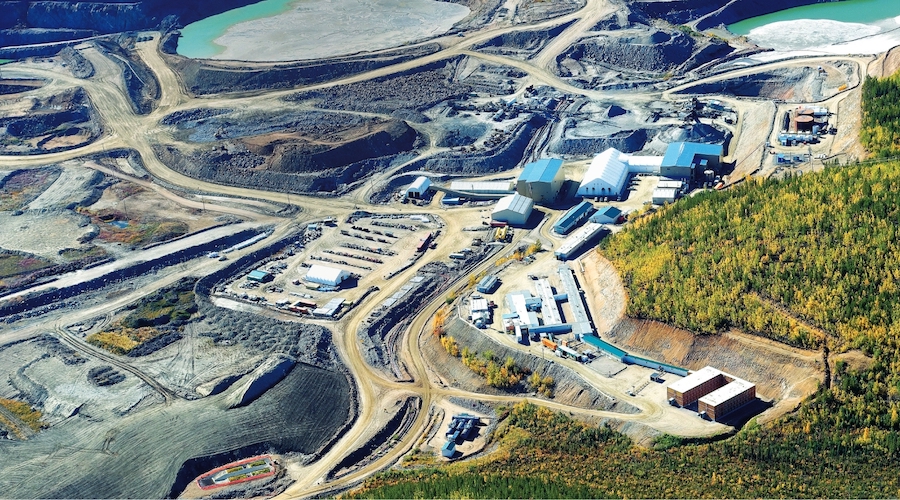Yukon gov’t raised red flags about copper mine before owner abandoned site

The Yukon government raised red flags about a copper mine’s environmental infractions days before the owner abandoned the site last month, an inspection report shows.
The new report filed this month by two employees of the territory’s Department of Energy, Mines and Resources says they inspected Minto Metals Corp.’s mining site on April 26, finding that its storage capacity for contaminated water in an open pit and tailings waste management were unsatisfactory.
New infrastructure was already being installed on the day of the inspection to double the capacity of water treatment.
Minto informed the Yukon government on May 12 that it had abruptly ceased operations and abandoned the mine, effectively handing control over to the territory. On May 14, Minto moved the remaining workers off the site, located about 240 kilometres northwest of Whitehorse.
The surprise shutdown of the copper mine, which began production in 2007, put more than 180 Minto employees and subcontractors out of work. The president and chief executive officer, alongside other Minto directors, resigned from the company’s board in mid-May. The TSX Venture Exchange suspended trading in Minto shares, effective May 18.
The mining site was first staked in 1971. Over the decades, owners have included Sherwood Copper Corp., Capstone Mining Corp. and Minto.
The Yukon government had been concerned that water from the annual spring melting of snow would overwhelm the main open pit. But with that seasonal risk of overflow averted, it cancelled contingency plans to pump some of the contaminated water into another open pit.
The government was able to quickly respond after Minto left the site, and there is no imminent risk to the environment, John Miller, a manager in the Department of Energy, Mines and Resources, said in an interview Tuesday.
“The actual property itself was running out of storage capacity for contaminated water,” Mr. Miller said.
During the April 26 tour of the mining site, department employees Kyle Nault and Matt Jenner noticed a spill of waste oil. They were accompanied in their inspection by two Minto staffers: environmental manager Shawn Horte and technician Ian Smith.
Mr. Nault and Mr. Jenner also discovered other environmental infractions, including various fuel spills.
“The underground truck shop and the adjacent equipment laydown area were in a state of neglect,” according to the inspection report submitted by Mr. Nault, a natural resource officer.
“Special waste was piling up and 10 spills were noted during the inspection,” the report said. “Piles of contaminated soil and snow were discovered, but not reported prior, in four locations.”
On May 5, Mr. Horte wrote a memo to Mr. Nault to assure him that the company had the situation under control.
“Special waste will be picked up on a regular basis and enhanced supervisor inspections will occur to prevent spills or mitigate in a timely manner,” Mr. Horte said.
He estimated that the spill of waste oil was only five litres, based on a visual inspection.
“The spill location is approximately two kilometres from the mine’s final discharge point to Minto Creek and around one kilometre from the drinking water well,” Mr. Horte said. “Based on the location of the spill and the still-frozen condition of the surrounding soil, there is no reason to believe that any water was impacted.”
One week after Mr. Horte wrote his memo in an attempt to assuage environmental concerns, the Yukon government took control of the copper mine.
While Minto had previously provided C$75.2-million in financial security to the Yukon government, it still owes another C$18-million to the territory in a contingency fund for reclamation and other cleanup costs in the event of a shutdown.
Minto also owes at least C$2.5-million in royalties that were to be collected by the Yukon government on behalf of the Selkirk First Nation, said John Streicker, the territory’s Energy Minister, in a recent interview.
“We had known that Minto was facing some financial challenges for some time,” Mr. Streicker said.
Todd Powell, director of mineral resources at the Department of Energy, Mines and Resources, wrote a letter after the mine’s shutdown to Chris Stewart, Minto’s then-president and chief executive officer.
The Yukon government needed to intervene and “conduct critical short-term water management and water treatment at the site for environmental protection purposes,” Mr. Powell wrote.
{{ commodity.name }}
{{ post.title }}
{{ post.date }}




Comments